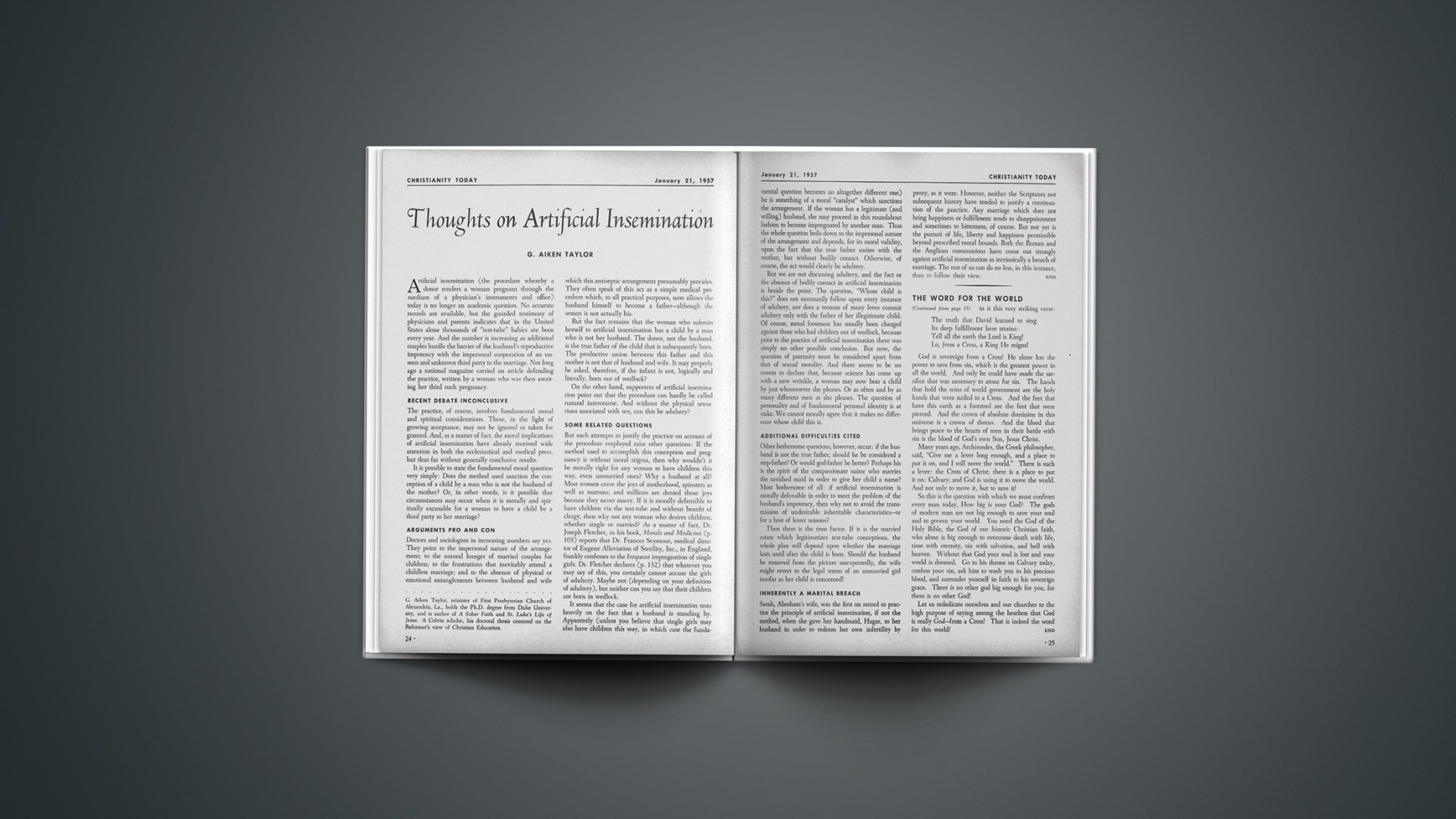Artificial insemination (the procedure whereby a donor renders a woman pregnant through the medium of a physician’s instruments and office) today is no longer an academic question. No accurate records are available, but the guarded testimony of physicians and parents indicates that in the United States alone thousands of “test-tube” babies are born every year. And the number is increasing as additional couples hurdle the barrier of the husband’s reproductive impotency with the impersonal cooperation of an unseen and unknown third party to the marriage. Not long ago a national magazine carried an article defending the practice, written by a woman who was then awaiting her third such pregnancy.
Recent Debate Inconclusive
The practice, of course, involves fundamental moral and spiritual considerations. These, in the light of growing acceptance, may not be ignored or taken for granted. And, as a matter of fact, the moral implications of artificial insemination have already received wide attention in both the ecclesiastical and medical press, but thus far without generally conclusive results.
It is possible to state the fundamental moral question very simply: Does the method used sanction the conception of a child by a man who is not the husband of the mother? Or, in other words, is it possible that circumstances may occur when it is morally and spiritually excusable for a woman to have a child by a third party to her marriage?
Arguments Pro And Con
Doctors and sociologists in increasing numbers say yes. They point to the impersonal nature of the arrangement; to the natural hunger of married couples for children; to the frustrations that inevitably attend a childless marriage; and to the absence of physical or emotional entanglements between husband and wife which this antiseptic arrangement presumably provides. They often speak of this act as a simple medical procedure which, to all practical purposes, now allows the husband himself to become a father—although the semen is not actually his.
But the fact remains that the woman who submits herself to artificial insemination has a child by a man who is not her husband. The donor, not the husband, is the true father of the child that is subsequently born. The productive union between this father and this mother is not that of husband and wife. It may properly be asked, therefore, if the infant is not, logically and literally, born out of wedlock?
On the other hand, supporters of artificial insemination point out that the procedure can hardly be called natural intercourse. And without the physical sensations associated with sex, can this be adultery?
Some Related Questions
But such attempts to justify the practice on account of the procedure employed raise other questions: If the method used to accomplish this conception and pregnancy is without moral stigma, then why wouldn’t it be morally right for any woman to have children this way, even unmarried ones? Why a husband at all? Most women crave the joys of motherhood, spinsters as well as matrons; and millions are denied those joys because they never marry. If it is morally defensible to have children via the test-tube and without benefit of clergy, then why not any woman who desires children, whether single or married? As a matter of fact, Dr. Joseph Fletcher, in his book, Morals and Medicine (p. 103) reports that Dr. Frances Seymour, medical director of Eugene Alleviation of Sterility, Inc., in England, frankly confesses to the frequent impregnation of single girls. Dr. Fletcher declares (p. 132) that whatever you may say of this, you certainly cannot accuse the girls of adultery. Maybe not (depending on your definition of adultery), but neither can you say that their children are born in wedlock.
It seems that the case for artificial insemination rests heavily on the fact that a husband is standing by. Apparently (unless you believe that single girls may also have children this way, in which case the fundamental question becomes an altogether different one) he is something of a moral “catalyst” which sanctions the arrangement. If the woman has a legitimate (and willing) husband, she may proceed in this roundabout fashion to become impregnated by another man. Thus the whole question boils down to the impersonal nature of the arrangement and depends, for its moral validity, upon the fact that the true father unites with the mother, but without bodily contact. Otherwise, of course, the act would clearly be adultery.
But we are not discussing adultery, and the fact or the absence of bodily contact in artificial insemination is beside the point. The question, “Whose child is this?” does not necessarily follow upon every instance of adultery, nor does a woman of many loves commit adultery only with the father of her illegitimate child. Of course, moral looseness has usually been charged against those who had children out of wedlock, because prior to the practice of artificial insemination there was simply no other possible conclusion. But now, the question of paternity must be considered apart from that of sexual morality. And there seems to be no reason to declare that, because science has come up with a new wrinkle, a woman may now bear a child by just whomsoever she pleases. Or as often and by as many different men as she pleases. The question of personality and of fundamental personal identity is at stake. We cannot morally agree that it makes no difference whose child this is.
Additional Difficulties Cited
Other bothersome questions, however, occur: if the husband is not the true father, should he be considered a step-father? Or would god-father be better? Perhaps his is the spirit of the compassionate suitor who marries the ravished maid in order to give her child a name? Most bothersome of all: if artificial insemination is morally defensible in order to meet the problem of the husband’s impotency, then why not to avoid the transmission of undesirable inheritable characteristics—or for a host of lesser reasons?
Then there is the time factor. If it is the married estate which legitimatizes test-tube conceptions, the whole plan will depend upon whether the marriage lasts until after the child is born. Should the husband be removed from the picture unexpectedly, the wife might revert to the legal status of an unmarried girl insofar as her child is concerned!
Inherently A Marital Breach
Sarah, Abraham’s wife, was the first on record to practice the principle of artificial insemination, if not the method, when she gave her handmaid, Hagar, to her husband in order to redeem her own infertility by proxy, as it were. However, neither the Scriptures nor subsequent history have tended to justify a continuation of the practice. Any marriage which does not bring happiness or fulfillment tends to disappointment and sometimes to bitterness, of course. But not yet is the pursuit of life, liberty and happiness permissible beyond prescribed moral bounds. Both the Roman and the Anglican communions have come out strongly against artificial insemination as intrinsically a breach of marriage. The rest of us can do no less, in this instance, than to follow their view.
G. Aiken Taylor, minister of First Presbyterian Church of Alexandria, La., holds the Ph.D. degree from Duke University, and is author of A Sober Faith and St. Luke’s Life of Jesus. A Calvin scholar, his doctoral thesis centered on the Reformer’s view of Christian Education.










